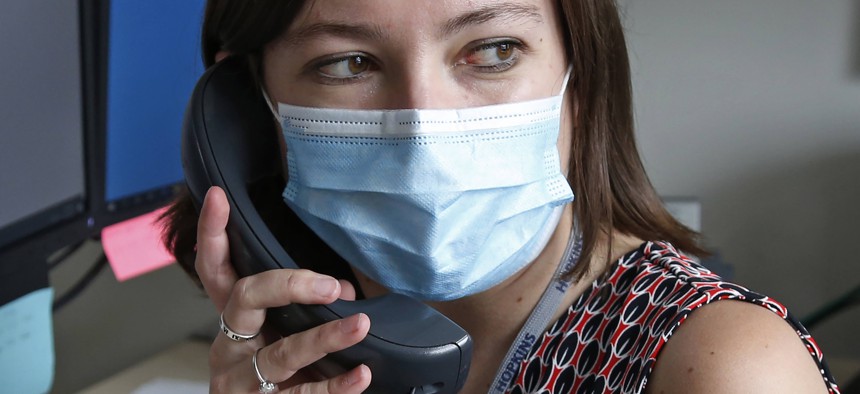A City Looks to Expand Its Virus Tracing Workforce in Distressed Neighborhoods

A health investigator in Salt Lake County, Utah works the phones in this May 19 photograph. States and local governments around the U.S. are looking to expand coronavirus contact tracing programs. AP Photo/Rick Bowmer
Chicago is one of the latest jurisdictions around the U.S. seeking to beef up its contact tracing program. Experts say it’s a key step towards reopening the economy.
Chicago officials on Tuesday said the city would spend $56 million in state and federal funding and marshal a 600-person local workforce in economically distressed areas to help track down people who’ve come into contact with individuals diagnosed with the coronavirus.
It’s among the latest efforts by municipal and state governments to expand so-called contact tracing initiatives. The programs are seen as crucial for preventing flare ups of the highly contagious virus as the nation looks to further reopen the economy in the coming weeks.
Chicago, a city of 2.6 million people, has had over 42,400 coronavirus cases and at least 1,940 confirmed deaths from Covid-19, the respiratory illness that the virus causes, city figures show. At least 1,430 of the fatal cases were black or Latino residents and 1,566 were 60 or older.
“The south side community is nearly 77% African American and 12% Hispanic. These populations have been impacted the most by the COVID-19 crisis,” Brenda Battle, chief diversity, inclusion and equity officer at University of Chicago Medicine, said in a statement.
Chicago Department of Public Health Commissioner Allison Arwady noted: "Contact tracing at the community-level will help us build out our public health infrastructure to reach even more Chicagoans."
On Tuesday, the city released a $56 million request for proposals, seeking organizations to lead expanded contact tracing efforts. The city plans to cover the cost using funds from the U.S. Centers for Disease Control and Prevention and the Illinois Department of Public Health.
Under the terms of the RFP, the lead organization the city selects will have to sub-grant 85% of the contact tracing money to at least 30 neighborhood-based groups that serve parts of the city that are struggling economically.
The neighborhood level groups will be responsible for overseeing the recruitment and hiring of the 600 contact tracers, supervisors and other workers who will support the program. Contact tracers will earn $20 an hour and supervisors $24 an hour.
In late April, a group of high-profile public health experts sent a letter to congressional leaders estimating that the U.S. would need to expand its contact tracing workforce by about 180,000, at least until there’s a safe and effective Covid-19 vaccine on the market.
Total funding to support the tracing efforts they view as necessary would be about $12 billion, they estimated in their letter. They also note that a contact tracing program in Massachusetts recently drew about 15,000 applicants for 1,000 positions in two weeks time.
Contact tracing is meant to work together with Covid-19 testing programs and quarantine guidelines to help stanch the spread of the disease. Part of what makes the virus difficult to control is that people who have it and are contagious don’t always show obvious symptoms.
The idea is that if people can be tested for the coronavirus efficiently, and someone tests positive for it, teams of contact tracers can interview these people and then get in touch with others who the ill person may have come into close contact with.
If necessary, these people can then self-quarantine for a period of time to prevent the disease from spreading further.
The Centers for Disease Control and Prevention said last week that it was delivering $10.25 billion in recently appropriated federal funding to states, territories and local governments that is intended to support Covid-19 testing, contact tracing and other initiatives.
This money is one of several streams of federal dollars flowing to the state and local level to help pay for coronavirus response activities.
Wisconsin is one example of a state government that is growing its contact tracing capabilities.
Gov. Tony Evers last week said that the state planned to put about $75 million of federal funding towards contact tracing, with $50 million of it available to local and tribal public health departments to hire staff that would work on tracing and other related activity.
The state has also acquired new analytics software to support this work, has reassigned over 200 employees from their normal duties to call people who may have been exposed to the disease, and has plans to hire additional short-term contact tracing staff in the coming weeks.
Bill Lucia is a senior reporter for Route Fifty and is based in Olympia, Washington.
NEXT STORY: Minneapolis Officers Fired After Man Dies in Police Custody






